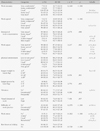Abstract
Purpose
The purpose of this study was to investigate the relations between fatigue and work-related factors in workers.
Methods
A total of 204 subjects aged between 21 and 59 were selected through convenient sampling. Data were collected with a self-reported questionnaire from May 20 to 31, 2011. Collected data were analyzed with SPSS/WIN 17.0.
Results
Difference in fatigue according to general characteristics was significant according to duty type. Difference in fatigue according to occupational characteristics was significant according to work intensity, work speed, demand of work concentration, work space, physical environment, largest weight by hands, vibration, visual demand of work, difficulty of work practice, work stress, and rest hours in holiday. There was a positive correlation between fatigue and occupational characteristics. Stepwise multiple regression analyses showed that educational level, work intensity, and rest hours in holiday were the strongest factors associated with fatigue (R2=.363 p<.001). These factors explained fatigue by 36.3%.
Figures and Tables
References
1. Ahn YH, Song NH, Jung ES, Yoo KS, Lee WY, Oh MS, et al. Community Nursing. Seoul: Jungdam;2009.
2. Akerstedt T, Knutsson A, Westerholm P, Theorell T, Alfredsson L, Kecklund G. Sleep disturbance, work stress and work hours a cross-sectional study. J Psychosom Res. 2002; 53:741–748.
3. Alfredsson L, Akerstedt M, Mattsson M, Wilborg B. Self-reported health and well-being amongst night security grades: A comparison with the working population. Ergonomics. 1991; 34:525–530.
4. Bültmann U, Kant IJ, van Amelsvoort LG, van den Brandt PA, Kasl SV. Differences in fatigue and psychological distress across occupations: Results from the massastricht cohort study of fatigue at work. J Occup Environ Med. 2001; 43(11):976–983.
5. Carpenito LJ. Nursing diagnosis: Application to clinical practice. Philadelphia: J. B. Lippincott;1992.
6. Chang SJ. Standardization of collection and measurement of health statistics data. Seoul: The Korean Society for Preventive Medicine;2000.
7. Chang SJ, Koh SB, Kang MG, Hyun SJ, Cha BS, Park JK, et al. Correlates of self-rated fatigue in Korean employees. J Prev Med Public Health. 2005; 38(1):71–81.
9. Ha HJ. The comparative study on the industrial fatigue depending on the working condition among cooks in the hotel. Suwon: Kyonggi University;2006. Unpublished master's thesis.
10. Han DH, Lee JH. Occupational and hygienics. Seoul: Shinkwang;2004.
11. Hanlon T, Tabachnikova ED, Suresh S. Fatigue behavior of nanocrystalline metals and alloys. Int J Fatigue. 2005; 27:1149.

12. Jang JH, Kang D, Koh SB, Kim J, Cho BM, Lee SI. Work related factors affecting perceived fatigue in male metal assemblers. Korean J Occup Environ Med. 2004; 16(2):155–165.
13. Kang JW, Hong YS, Lee HJ, Yeah BJ, Kim JI, Kim JM, et al. Factors affecting fatigue and stress in male manufacturing workers. Korean J Occup Environ Med. 2005; 17(2):129–137.

14. Kant IJ, Bültmann U, Schröer KA, Beurskens AJ, Van Amelsvoort LG, Swaen GM. An epidemiological approach to study fatigue in the working population: the Maastricht Cohort Study. Occup Environ Med. 2003; 60:Suppl 1. i32–i39.

15. Kwon YN. A study of MSDs and their policy reform for workers in healthcare and medical fields. Seoul: Seoul National University of Technology;2008. Unpublished master's thesis.
16. Lee HK. A study on the crew's fatigue. Busan: Korea Maritime University;1999. Unpublished master's thesis.
17. Lee KS, Lee DB, Kwon IS, Cho YC. Depressive symptoms and their association with sleep quality, occupational stress and fatigue among small-scaled manufacturing male workers. Korean J Occup Environ Med. 2011; 23(2):99–111.

18. Li G, Bucke P. The development of a practical method for the exposure assessment of risks to work-related musculoskeletal disorders (General report to the HSE. No. R3408). Wimbledon London: Robens Centre for Health Ergonomics, European Institute of Health and Medical Sciences;1998.
19. Lee NW. Occupational hygienic management. Seoul: Shinkwang;1998.
20. Oh YA, Lee MS, Rhee KY. Relationship between Manufacturing Workers'Job Conditions and Stress. Korean J Occup Environ Med. 2002; 14(3):301–314.

21. Park GH. Occupational and Hygiene management. Seoul: Dongwha;2004.
22. Park NK, Kim JY, Cho YC, Lee DB. Relationship Between Fatigue Symptomes and Life Style Factors Among Industrial Workers. Korean J Occup Environ Med. 1998; 10(2):214–226.

23. Schwartz JE, Jandorf L, Krupp LB. The measurement of fatigue: A new instrument. J Psychosom Res. 1993; 37(7):753–762.

24. Sluiter JK, Beek AJ, Frings-Dresen MH. The influence of work characteristics on the need for recovery and experienced health: A study on coach drivers. Ergonomics. 1999; 42:573–583.

25. Sluiter JK, de Croon EM, Meijman TF, Frings-Dresen MH. Need for recovery from work related fatigue and its role in the development and prediction of subjective health complaints. Occup Environ Med. 2003; 60:Suppl 1. i62–i70.

26. Smith L, Folkard S, Tucker P. Work shift duration: A review comparing eight hour and 12 hour shift systems. Occup Environ Med. 1998; 55:217–229.

27. Swaen GM, van Amelsvoort LG, Bültmann U, Kant IJ. Fatigue as a risk factor for being injured in an occupational accident: results from the Maastricht Cohort Study. Occup Environ Med. 2003; 60:Suppl 1. i88–i92.

28. Wang MJ, Cho SJ, Cho YH, Park IH, Koh JE, Choi HJ, et al. Community Nursing. Seoul: Hyunmunsa;2010.
29. Weijman I, Ros WJ, Rutten GE, Schaufeli WB, Schabracq MJ, Winnubst JA. Fatigue in employees with diabetes: its relation with work characteristics and diabetes related burden. Occup Environ Med. 2003; 60:Suppl 1. i93–i98.

30. Yang IA. Study on subjective symptom of fatigue in unmarried woman workers. Gwangju: Chonnam University;1990. Unpublished master's thesis.




 PDF
PDF ePub
ePub Citation
Citation Print
Print






 XML Download
XML Download